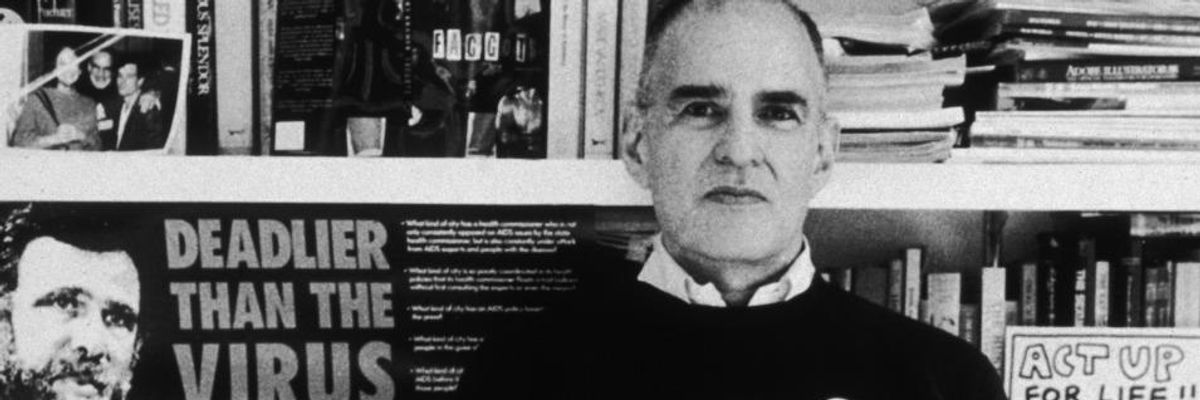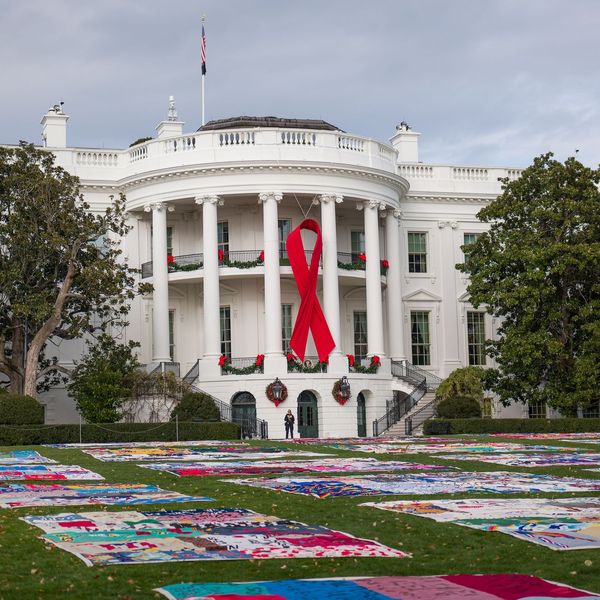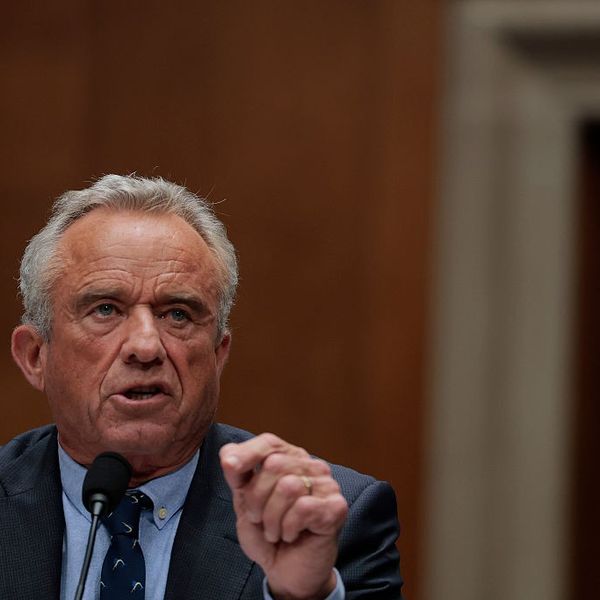
American author, AIDS campaigner and gay rights activist Larry Kramer, founder of ACT-UP and the Gay Men's Health Crisis group, posing in front of a book shelf in his home in New York City in 1989. (Photo: Sara Krulwich/New York Times Co./Getty Images)
Pioneering AIDS Activist Larry Kramer--Whose "Rage Helped Inspire a Movement"--Dead at 84
"There is no question in my mind that Larry helped change medicine in this country," said Dr. Anthony Fauci. "And he helped change it for the better."
LGBTQ rights and public health advocates mourned an "incalculable" loss on Wednesday when influential AIDS activist and writer Larry Kramer died of pneumonia at the age of 84.
Kramer came to fame in the 1980s for his forceful demands for a national response to the AIDS epidemic as it killed tens of thousands of people, including many gay men.
As AIDS patients and gay men were stigmatized and President Ronald Reagan refused to publicly acknowledge the disease until 1985--when more than 5,000 people had already died--Kramer established Gay Men's Health Crisis, the first organization dedicated to providing public services to HIV-positive people.
In 1987, Kramer began ACT-UP (AIDS Coalition to Unleash Power), which became known for its disruptive--and ultimately effective--public actions demanding the federal government rapidly research potential treatments for AIDS and fighting discrimination against the LGBTQ community.
\u201cRIP, Larry Kramer -- founder of ACT-UP.\n\nHere's footage from when ACT-UP placed the ashes of people who died from AIDS on the lawn of the White House in 1992 in an act of love and protest.\u201d— Waleed Shahid (@Waleed Shahid) 1590601892
In The New Yorker in 2002, Michael Specter wrote that Kramer "may be responsible for more public arrests than anyone since the height of the civil rights movement," describing some of the public demonstrations he led:
AIDS activists who tried to dump the ashes of a young friend onto the South Lawn of the White House; protesters who shut down the floor of the New York Stock Exchange, surrounded the Food and Drug Administration headquarters, and chained themselves to the gates at the headquarters of the pharmaceutical giant Hoffman-La Roche and to the Golden Gate Bridge. In 1989, Kramer even called for riots before the annual international AIDS meeting convened in San Francisco. When Louis Sullivan, the secretary of the Department of Health and Human Services, delivered the closing address, he was pelted mercilessly with condoms.
Kramer took aim at Dr. Anthony Fauci, who took the helm of the National Institute of Allergy and Infectious Diseases (NIAID) in 1984 and is now a leader in the U.S. government's response to the coronavirus pandemic.
Blaming Fauci for the government's slow response to the AIDS epidemic, Kramer publicly called him an "incompetent idiot" and a murderer in the pages of the San Francisco Examiner in 1988. Fauci later credited Kramer with drawing attention at the federal level to the damage that was being done by bureaucratic delays in the search for effective AIDS treatments.
"In American medicine, there are two eras," Fauci told The New Yorker in 2002. "Before Larry and after Larry... There is no question in my mind that Larry helped change medicine in this country. And he helped change it for the better."
Kramer also wrote the acclaimed, autobiographical play "The Normal Heart" about his activism work and the federal government's indifference to AIDS in the 1980s.
Sarah Kate Ellis, president of GLAAD, remembered Kramer as "an undeniable accelerant who not only fearlessly demanded change, but made it come to pass."
\u201cLarry Kramer\u2019s contributions to the LGBTQ movement and the fight against HIV/AIDS are incalculable. @glaad and so many LGBTQ people and allies recognize Larry as an undeniable accelerant who not only fearlessly demanded change, but made it come to pass. \nhttps://t.co/HBlo7ZOjbK\u201d— Sarah Kate Ellis (@Sarah Kate Ellis) 1590597941
The New York Times drew criticism Wednesday for beginning its obituary for Kramer by claiming his achievements as an activist were sometimes overshadowed by his "abusive" approach, later amending the article to say "confrontational."
"Neither 'abusive' nor 'confrontational' really capture Kramer's approach," wrote Matt Baume at The Stranger. "'Heroic' might come close. Kramer's entire life was dedicated to saving bodies and minds that those in power had decided weren't worth saving. His achievements aren't overshadowed by his intensity, they're thanks to it."
On social media, ACT-UP began the viral hashtag #ThankYouLarry, encouraging those inspired by Kramer to "honor his legacy with anger and action."
\u201cSome of my most vivid political memories as a closeted gay teenager growing up in Texas were televised scenes of the righteous anger of Larry Kramer. He saved lives and changed the world. #ThankYouLarry\u201d— Damon Seils \ud83c\udff3\ufe0f\u200d\ud83c\udf08 (@Damon Seils \ud83c\udff3\ufe0f\u200d\ud83c\udf08) 1590599807
\u201c@actupny His activism inspired and saved countless lives around the world, including mine. \n\nI got to see him at an event almost 10 years ago and thanked him for his activism and he kindly encouraged me to not run away from anger to fuel my work. \n\n#ThankYouLarry \ud83d\udda4\ud83c\udff3\ufe0f\u200d\ud83c\udf08\u201d— ACT UP NY (@ACT UP NY) 1590598174
"Rest in power to our fighter Larry Kramer," ACT-UP tweeted. "Your rage helped inspire a movement. We will keep honoring your name and spirit with action."
An Urgent Message From Our Co-Founder
Dear Common Dreams reader, The U.S. is on a fast track to authoritarianism like nothing I've ever seen. Meanwhile, corporate news outlets are utterly capitulating to Trump, twisting their coverage to avoid drawing his ire while lining up to stuff cash in his pockets. That's why I believe that Common Dreams is doing the best and most consequential reporting that we've ever done. Our small but mighty team is a progressive reporting powerhouse, covering the news every day that the corporate media never will. Our mission has always been simple: To inform. To inspire. And to ignite change for the common good. Now here's the key piece that I want all our readers to understand: None of this would be possible without your financial support. That's not just some fundraising cliche. It's the absolute and literal truth. We don't accept corporate advertising and never will. We don't have a paywall because we don't think people should be blocked from critical news based on their ability to pay. Everything we do is funded by the donations of readers like you. Will you donate now to help power the nonprofit, independent reporting of Common Dreams? Thank you for being a vital member of our community. Together, we can keep independent journalism alive when it’s needed most. - Craig Brown, Co-founder |
LGBTQ rights and public health advocates mourned an "incalculable" loss on Wednesday when influential AIDS activist and writer Larry Kramer died of pneumonia at the age of 84.
Kramer came to fame in the 1980s for his forceful demands for a national response to the AIDS epidemic as it killed tens of thousands of people, including many gay men.
As AIDS patients and gay men were stigmatized and President Ronald Reagan refused to publicly acknowledge the disease until 1985--when more than 5,000 people had already died--Kramer established Gay Men's Health Crisis, the first organization dedicated to providing public services to HIV-positive people.
In 1987, Kramer began ACT-UP (AIDS Coalition to Unleash Power), which became known for its disruptive--and ultimately effective--public actions demanding the federal government rapidly research potential treatments for AIDS and fighting discrimination against the LGBTQ community.
\u201cRIP, Larry Kramer -- founder of ACT-UP.\n\nHere's footage from when ACT-UP placed the ashes of people who died from AIDS on the lawn of the White House in 1992 in an act of love and protest.\u201d— Waleed Shahid (@Waleed Shahid) 1590601892
In The New Yorker in 2002, Michael Specter wrote that Kramer "may be responsible for more public arrests than anyone since the height of the civil rights movement," describing some of the public demonstrations he led:
AIDS activists who tried to dump the ashes of a young friend onto the South Lawn of the White House; protesters who shut down the floor of the New York Stock Exchange, surrounded the Food and Drug Administration headquarters, and chained themselves to the gates at the headquarters of the pharmaceutical giant Hoffman-La Roche and to the Golden Gate Bridge. In 1989, Kramer even called for riots before the annual international AIDS meeting convened in San Francisco. When Louis Sullivan, the secretary of the Department of Health and Human Services, delivered the closing address, he was pelted mercilessly with condoms.
Kramer took aim at Dr. Anthony Fauci, who took the helm of the National Institute of Allergy and Infectious Diseases (NIAID) in 1984 and is now a leader in the U.S. government's response to the coronavirus pandemic.
Blaming Fauci for the government's slow response to the AIDS epidemic, Kramer publicly called him an "incompetent idiot" and a murderer in the pages of the San Francisco Examiner in 1988. Fauci later credited Kramer with drawing attention at the federal level to the damage that was being done by bureaucratic delays in the search for effective AIDS treatments.
"In American medicine, there are two eras," Fauci told The New Yorker in 2002. "Before Larry and after Larry... There is no question in my mind that Larry helped change medicine in this country. And he helped change it for the better."
Kramer also wrote the acclaimed, autobiographical play "The Normal Heart" about his activism work and the federal government's indifference to AIDS in the 1980s.
Sarah Kate Ellis, president of GLAAD, remembered Kramer as "an undeniable accelerant who not only fearlessly demanded change, but made it come to pass."
\u201cLarry Kramer\u2019s contributions to the LGBTQ movement and the fight against HIV/AIDS are incalculable. @glaad and so many LGBTQ people and allies recognize Larry as an undeniable accelerant who not only fearlessly demanded change, but made it come to pass. \nhttps://t.co/HBlo7ZOjbK\u201d— Sarah Kate Ellis (@Sarah Kate Ellis) 1590597941
The New York Times drew criticism Wednesday for beginning its obituary for Kramer by claiming his achievements as an activist were sometimes overshadowed by his "abusive" approach, later amending the article to say "confrontational."
"Neither 'abusive' nor 'confrontational' really capture Kramer's approach," wrote Matt Baume at The Stranger. "'Heroic' might come close. Kramer's entire life was dedicated to saving bodies and minds that those in power had decided weren't worth saving. His achievements aren't overshadowed by his intensity, they're thanks to it."
On social media, ACT-UP began the viral hashtag #ThankYouLarry, encouraging those inspired by Kramer to "honor his legacy with anger and action."
\u201cSome of my most vivid political memories as a closeted gay teenager growing up in Texas were televised scenes of the righteous anger of Larry Kramer. He saved lives and changed the world. #ThankYouLarry\u201d— Damon Seils \ud83c\udff3\ufe0f\u200d\ud83c\udf08 (@Damon Seils \ud83c\udff3\ufe0f\u200d\ud83c\udf08) 1590599807
\u201c@actupny His activism inspired and saved countless lives around the world, including mine. \n\nI got to see him at an event almost 10 years ago and thanked him for his activism and he kindly encouraged me to not run away from anger to fuel my work. \n\n#ThankYouLarry \ud83d\udda4\ud83c\udff3\ufe0f\u200d\ud83c\udf08\u201d— ACT UP NY (@ACT UP NY) 1590598174
"Rest in power to our fighter Larry Kramer," ACT-UP tweeted. "Your rage helped inspire a movement. We will keep honoring your name and spirit with action."
LGBTQ rights and public health advocates mourned an "incalculable" loss on Wednesday when influential AIDS activist and writer Larry Kramer died of pneumonia at the age of 84.
Kramer came to fame in the 1980s for his forceful demands for a national response to the AIDS epidemic as it killed tens of thousands of people, including many gay men.
As AIDS patients and gay men were stigmatized and President Ronald Reagan refused to publicly acknowledge the disease until 1985--when more than 5,000 people had already died--Kramer established Gay Men's Health Crisis, the first organization dedicated to providing public services to HIV-positive people.
In 1987, Kramer began ACT-UP (AIDS Coalition to Unleash Power), which became known for its disruptive--and ultimately effective--public actions demanding the federal government rapidly research potential treatments for AIDS and fighting discrimination against the LGBTQ community.
\u201cRIP, Larry Kramer -- founder of ACT-UP.\n\nHere's footage from when ACT-UP placed the ashes of people who died from AIDS on the lawn of the White House in 1992 in an act of love and protest.\u201d— Waleed Shahid (@Waleed Shahid) 1590601892
In The New Yorker in 2002, Michael Specter wrote that Kramer "may be responsible for more public arrests than anyone since the height of the civil rights movement," describing some of the public demonstrations he led:
AIDS activists who tried to dump the ashes of a young friend onto the South Lawn of the White House; protesters who shut down the floor of the New York Stock Exchange, surrounded the Food and Drug Administration headquarters, and chained themselves to the gates at the headquarters of the pharmaceutical giant Hoffman-La Roche and to the Golden Gate Bridge. In 1989, Kramer even called for riots before the annual international AIDS meeting convened in San Francisco. When Louis Sullivan, the secretary of the Department of Health and Human Services, delivered the closing address, he was pelted mercilessly with condoms.
Kramer took aim at Dr. Anthony Fauci, who took the helm of the National Institute of Allergy and Infectious Diseases (NIAID) in 1984 and is now a leader in the U.S. government's response to the coronavirus pandemic.
Blaming Fauci for the government's slow response to the AIDS epidemic, Kramer publicly called him an "incompetent idiot" and a murderer in the pages of the San Francisco Examiner in 1988. Fauci later credited Kramer with drawing attention at the federal level to the damage that was being done by bureaucratic delays in the search for effective AIDS treatments.
"In American medicine, there are two eras," Fauci told The New Yorker in 2002. "Before Larry and after Larry... There is no question in my mind that Larry helped change medicine in this country. And he helped change it for the better."
Kramer also wrote the acclaimed, autobiographical play "The Normal Heart" about his activism work and the federal government's indifference to AIDS in the 1980s.
Sarah Kate Ellis, president of GLAAD, remembered Kramer as "an undeniable accelerant who not only fearlessly demanded change, but made it come to pass."
\u201cLarry Kramer\u2019s contributions to the LGBTQ movement and the fight against HIV/AIDS are incalculable. @glaad and so many LGBTQ people and allies recognize Larry as an undeniable accelerant who not only fearlessly demanded change, but made it come to pass. \nhttps://t.co/HBlo7ZOjbK\u201d— Sarah Kate Ellis (@Sarah Kate Ellis) 1590597941
The New York Times drew criticism Wednesday for beginning its obituary for Kramer by claiming his achievements as an activist were sometimes overshadowed by his "abusive" approach, later amending the article to say "confrontational."
"Neither 'abusive' nor 'confrontational' really capture Kramer's approach," wrote Matt Baume at The Stranger. "'Heroic' might come close. Kramer's entire life was dedicated to saving bodies and minds that those in power had decided weren't worth saving. His achievements aren't overshadowed by his intensity, they're thanks to it."
On social media, ACT-UP began the viral hashtag #ThankYouLarry, encouraging those inspired by Kramer to "honor his legacy with anger and action."
\u201cSome of my most vivid political memories as a closeted gay teenager growing up in Texas were televised scenes of the righteous anger of Larry Kramer. He saved lives and changed the world. #ThankYouLarry\u201d— Damon Seils \ud83c\udff3\ufe0f\u200d\ud83c\udf08 (@Damon Seils \ud83c\udff3\ufe0f\u200d\ud83c\udf08) 1590599807
\u201c@actupny His activism inspired and saved countless lives around the world, including mine. \n\nI got to see him at an event almost 10 years ago and thanked him for his activism and he kindly encouraged me to not run away from anger to fuel my work. \n\n#ThankYouLarry \ud83d\udda4\ud83c\udff3\ufe0f\u200d\ud83c\udf08\u201d— ACT UP NY (@ACT UP NY) 1590598174
"Rest in power to our fighter Larry Kramer," ACT-UP tweeted. "Your rage helped inspire a movement. We will keep honoring your name and spirit with action."

